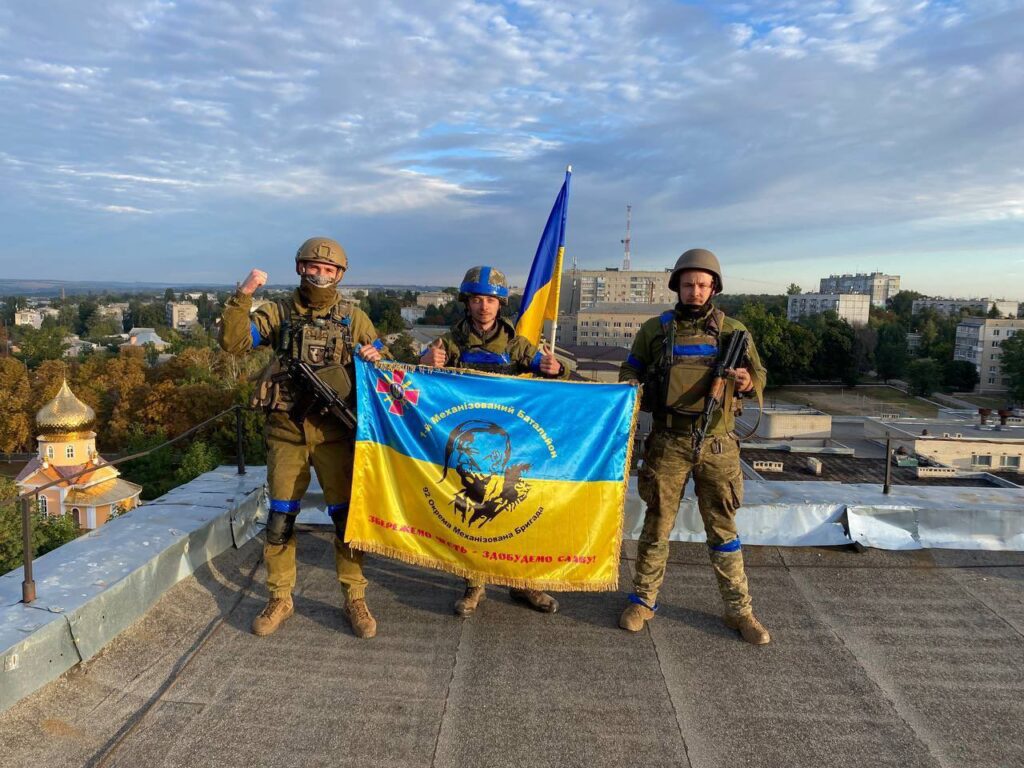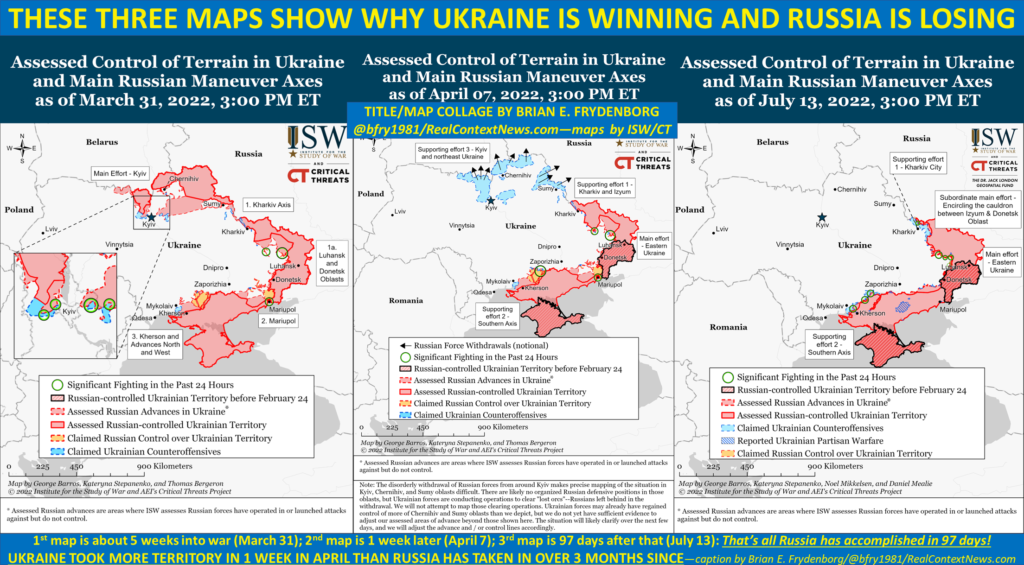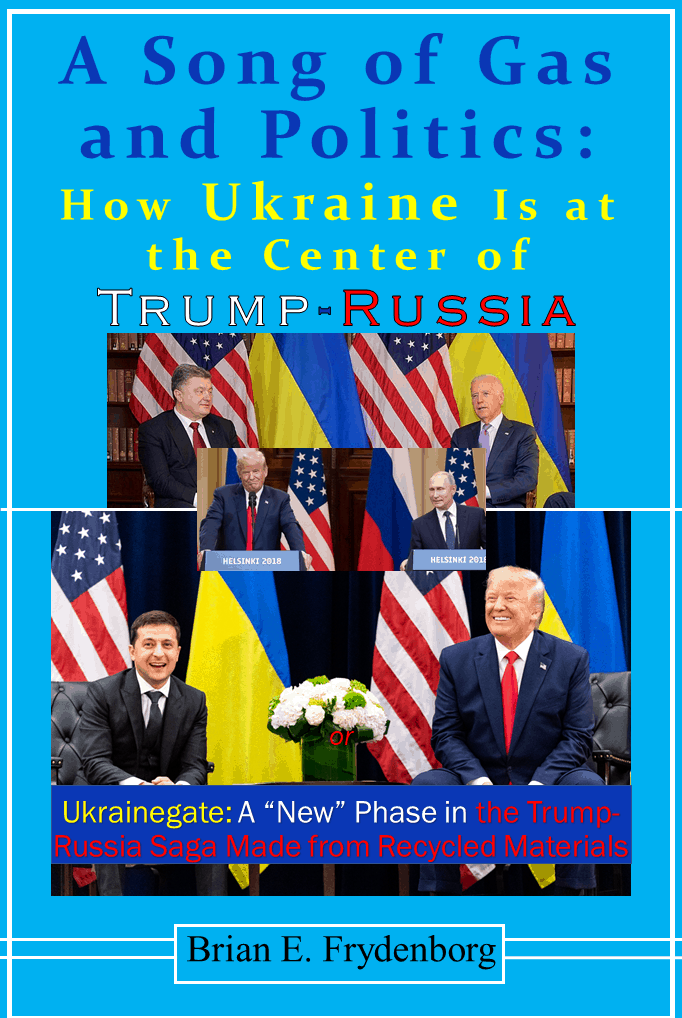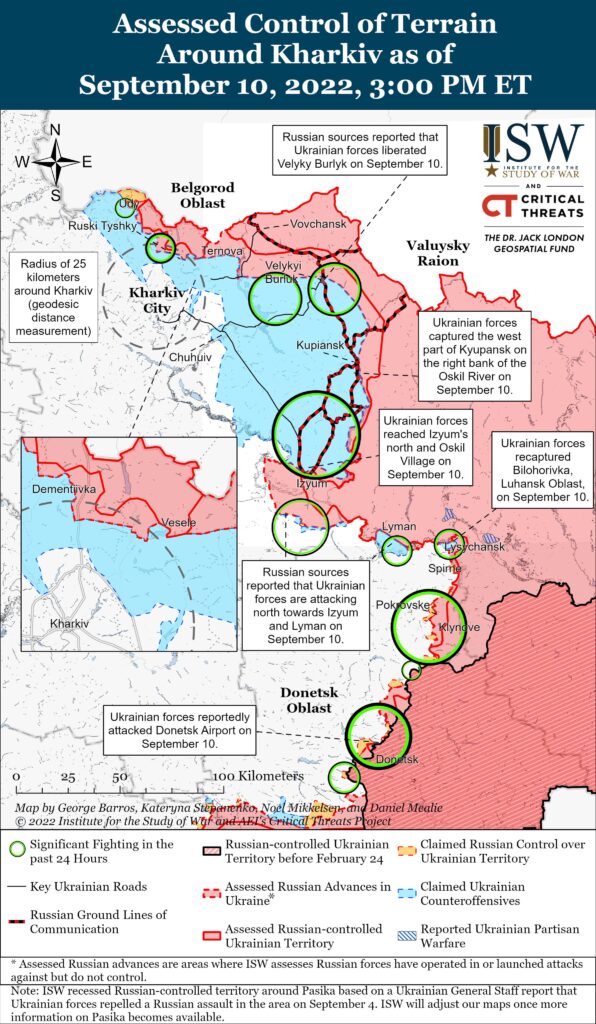Losing this badly will help wake up millions of Russians to some level of reality, and they will blame Putin. It is doubtful that the Russian military will keep fighting under these conditions for much longer.
(Russian/Русский перевод; Если вы состоите в российской армии и хотите сдаться Украине, звоните по этим номерам: +38 066 580 34 98 или +38 093 119 29 84; инструкции по сдаче здесь; traduction française)
By Brian E. Frydenborg (Twitter @bfry1981, LinkedIn, Facebook), September 10, 2022; article discussed in Brian’s interview with the French publication Atlantico published September 14; adapted excerpt published on September 12 by Small Wars Journal as Ukraine Writes the Textbook on Twenty-First Century Warfare, Conducts Masterclass, which, in turn, was featured by Real Clear Defense on September 16; see follow-up October 6 article This Is the Beginning of the End of the War and related articles from September 27 Why Putin Has Doomed Himself with His Ukraine Fiasco, September 16 I Saw This War Could Be Putin’s Undoing All the Way Back in Early March, and September 7 Why Is Russia Losing on 3 Fronts? Math (the Short Answer); also, since the 2022 Nobel Peace Prize was awarded on October 7 to Ukrainian activist Oleksandra Matviichuk and her organization the Center for Civil Liberties, listen to my April podcast with her here discussing war, Russian war crimes, human rights, and democracy in Ukraine.

SILVER SPRING—When this war began, I barely slept for weeks. What I and most others understood to essentially be the second most powerful military on earth had finally brought the hammer down on Ukraine, and was clearly going for regime change and who knows how much outright conquest (a lot; even before February 24, I noted it was clear Russian President Vladimir Putin was determined to have Ukraine at best be a vassal and at worst be annexed by Russia as part of a growing tsarist-like Empire). I was afraid that at any point in time, Kyiv would be turned into Grozny/Aleppo, killing thousands and thousands of civilians in the process, or that we’d find Ukrainian President Volodymyr Zelensky dead, strung up on a lamp post or shot in the head by assassins.
I thought Ukraine might put up a decent if brief fight, but that there was very little hope for fending off the Russians, and my dread was all consuming.
But then, even very early on, it was clear that Russia was taking horrific, historic casualties (as I pointed out, in not even two weeks, apparently more than U.S. forces suffered in the Iraq and Afghanistan wars combined). It was clear the Russian soldiers were not being well-led. It was clear that their logistics were terrible. It was clear that Russian troops did not have enough food or water. It was clear that their communications were not secure and their combined arms coordination was poor. It was clear that they did not have enough troops to take, let alone occupy, Kyiv. It was clear they did not maintain their vehicles well. It was clear they had no answer to or defense against Javelin and other anti-tank missiles. And then, starting in late March, there was that spectacular collapse of Russian forces on the Kyiv, Chernihiv, and Sumy fronts. Not long after, the sinking of the Russian Navy’s Black Sea Fleet flagship, the Moskva (I am likely the only person who predicted in an article that it would be sunk, at least in English), made it clear it could not defend against anti-ship missiles (and once you understood that, it was only logical that Crimea would be in play, as I noted in April).
What we were witnessing, in the social media age in an unprecedented way in its ultradocumentation, was one of the most thrilling upsets in military history, and it was only just getting started. It was the most surprising, remarkable thing I have witnessed in my entire adult life.
Russia would obviously have to change up its entire tactical and strategic approach to avoid utter disaster, because doing the same thing over and over again would be literal suicide. If it did not adjust, over enough time, this would destroy the Russian military and bring down the Putin regime; the military and the government would be killing themselves with nothing to show for it.
But Russia did not meaningfully adapt. It just insanely kept doing much the same thing over and over again, as if it was mentally incapable of adjusting. Instead, whatever adjustments have been made are minor and there is more continuity of what has produced failure than discernible changes that can be described as effective; since late March, Ukraine has retaken far more territory from Russia than the reverse; total defeat for Russia in Ukraine is far more likely than any sort of negotiated settlement, as I note here. Existing Russian leadership and the current Russian military have amply demonstrated that they do not have the ability to adjust enough to turn things around and win, and there are no examples in history of such colossal failure in war without deep and lasting consequences for the losing side; defeats of this magnitude normally result in imperial collapse and regime change from within, not the long continued rule of those who marched with hubris into folly.
Ukrainian Victory: A Mathematical Equation? Ukraine Writes the Textbook on Twenty-First Century Warfare, Conducts Masterclass
On March 8, less than two weeks into the war, Small Wars Journal published my piece stating that, this time, Putin had gone too far and this war would be his downfall. And absolutely nothing has happened since then that has made this less likely; dynamics are only making this more likely every day this war continues.
The Russian failures were the almost natural outcomes of years of Putinism, years of one man above all others running the show. This Ukraine war is the pinnacle of years of Putin’s rule, the best representation of him and the system he built, the people he elevated, the institutions he molded, the natural outcome of his leadership, and it will consume him and his system, an utterly predictable Frankenstein monster utterly predictably doing its father and creator in as can only be the case at this point. No one can, should, or will be blamed more inside Russia (let alone the rest of the world) for this debacle, just as he would have received most of the praise from Russians had this “special military operation” succeeded (calling it a war in Russia can get you arrested).
Thus, the terrible casualties and horrific reversals in March and early April exposed that the Russian military was not, in fact, the second most powerful in the world, that its training and the effectiveness of its tactics, the quality of its poorly-maintained vehicles, and the shoddy treatment of its own soldiers meant that what existed on paper and in intelligence estimates was not what Russia had in reality. “Impressive” against the tiny country of Georgia and poorly-armed Syrian rebels, when faced with a stronger foe in the Ukrainian Army, it was not impressive at all. In fact, the Ukrainian military is clearly better than Russia’s in a qualitative sense. And nothing will ram this home for Russians more than the vastly-mounting body count, the dead Russians with families in Russia; at some point, a critical mass will be hit and Putin will lose enough support that he will find massive protests making it impossible to govern, the bargain of taking Russians’ freedom in exchange for making them strong and stable at home and strong and respected abroad already null and void, it is just a matter of how bad the economy has to get (short-term measures to prop up Russia’s economy cannot be sustained and Russia’s economy will only get far worse over time), how many Russians have to die in battle, before the Russian people or those surrounding Putin rise up.
A lot of Russia’s best troops and equipment were destroyed in that first phase. The whole world watched Russian soldiers go into battle without enough food or water, carelessly led into ambushes time and time again. They watched as captured troops say they were lied to about where they were going and what they were doing. We saw perfectly good Russian tanks abandoned because they could not get fuel or ran out of ammunition because of terribly-run supply lines and logistics (just see Trent Telenko’s excellent threads on this topic). We saw poorly maintained equipment and vehicles fail and a lack of precision from Russian weapons systems. We saw terrible training, morale, and discipline. We saw Russian units run into the ground to the point of destruction and dissolution. And each one of these could be contrasted against essentially the opposite situations with Ukraine’s military. As I noted before, the dynamics are set, with things only getting worse for Russia and better for Ukraine.
Also remember that using HIMARS, drones, M777s, and other advanced Western equipment that Ukraine has been able to hit targets deep behind the front lines. That means that the support systems and defensive lines behind the front line will for Russia be particularly weak and that exhausted and demoralized troops without adequate supplies (the norm now) are not that far from their breaking points, that any serious breakthrough or pushback against Russian can quite easily result in the type of routs and rapid collapses we saw from late march to early April. We are seeing something like that happen now near Kharkiv and Izium and we will see more of these before the war is over unless the military revolts en masse. On the other hand, since that early phase, Russia has only been able to make small, slow gains, as Ukraine’s situation behind the lines is much better (Russia seems to not realize that lobbing missiles into cities may kill civilians but does little to hurt Ukraine’s military capabilities). And, as retired U.S. Gen. Mark Hertling keeps pointing out, Ukraine’s forces are operating with interior lines that are easy to reinforce and supply versus the much longer exterior lines of Russia.
And Ukraine is clearly in the driver’s seat: it is dictating the pace and location of fighting, and Russia is now only mostly able to react rather than initiate. As I have argued, Ukrainian prudence—methodically using comparative advantages to inflict high casualties at minimal risk and being able to react and take advantage of great opportunities as they arise, as we are seeing near Kharkiv and Izium now—is meeting Russian limitations, a set of deteriorating capabilities to define and dictate the course of the war. Much of what we are seeing unfolding thus has a mathematical quality to it, inputs and outputs favoring Ukraine and setting Russia up for failure.
So it was inevitable that large parts of this Russian military would simply break down and melt away if they were not destroyed after half-a-year of troops being poorly fed, not being properly briefed or trained. These were Russian troops who could tell after seeing Ukraine in person that their government was lying to them and their families about why they were going to war, who were seeing their lives thrown away carelessly and their friends and leaders die beside them, who had the bad luck to be led by the cruel and incompetent, who were being given slipshod equipment that was not reliable and that broke down often, who were not given enough ammunition or food or water, and who could not defend well against more modern weapons that Ukraine was using very effectively… these things all degrade morale and cohesion.
About Those “People’s Republic” Forces…
And let’s not forget that many of the troops in the east were Donetsk and Luhansk separatists (from their so-called namesake sham “People’s Republics”), mentored by this shoddy, third-rate Russian military, who could only inevitably be of relatively inferior quality to their already inferior mentors.
It is important to remember that the Ukrainian government was essentially not prosecuting the war against the Donetsk and Luhansk Russian proxies for two main related reasons: the Minsk agreements that Russia never honored were still something the Kyiv government was trying to more or less follow to prevent escalation and bloodshed, and that Kyiv nervous about the possibility of Russia becoming even more directly involved as a response to any major successful offensive against those proxies. Had Russia been not involved heavily and looming over Ukraine’s east, it is likely Ukraine could have put down the Donbas rebellions fairly easily, but obviously other factors were at play.
Russia’s self-defeating stupidity truly knows no bounds: a great way to help its imperial project work would be to invest in seriously training the Luhansk and Donetsk rebels well, equipping them well, and treating them and the people it was occupying well. This did not happen; indeed, the Russians instead are conscripting many people there against their will, are barely giving them any good equipment or training. Almost like they are insulting the very people they claim to be liberating, they are giving some of them World-War II-era, or even tsarist-era, rifles and are cruelly using these people as “cannon fodder” to feel out enemy positions, including against artillery. Instead of winning people over to their cause or maintaining levels of support where Russia already had relatively high levels of support before February 24, the Russians are steadily alienating the very people at the center of their propaganda and their claims to being the good guys in this conflict. If the goal is to make these places part of Russia over the long-run, mistreating the people you are going to “liberate” is only going to sow the seeds of your own failure.
In this case, it is even doubtful that many of the original tens of thousands Donetsk and Luhansk separatist militia troops allied with Russia are left standing, and it is certain that the replacement conscripts from there would not be terribly good or motivated fighters, especially with how they have been treated by Russia (indeed, it seems plenty are resisting conscription or are deserting). Their morale was already low and Russia was earlier having problems getting them to fight. Add to that the fact that some of the best Russian troops in the east were redeployed to the south, and the quality-level of Russian and separatist troops in the east right now is probably the lowest of any sector of fighting. The morale of conscripts from those areas and any remaining from the original separatist forces must be horrible and there are likely more than a few who are willing to provide intelligence to Ukrainian forces or even switch sides. On top of that, remember that even the superior regular Russian forces are not even that good, either, and that their morale is also extremely low. So it would actually be surprising if the Donbas lines and Russian/separatist positions in general did not collapse at some point in the face of a well-led, determined attack from Ukrainians.

The Beginning of the End of Putin
Poorly-equipped, poorly-trained, poorly-supplied, poorly-led troops who are fighting for a government with essentially no allies that lies to them for a cause that rings hollow to conquer and kill people in another country who essentially hate them are fighting well-equipped, well-trained, well-supplied, well-led troops who are defending their homes and families, fighting for their freedom, and are highly motivated to prevail, all with the help of many allies around the world.
The eventual rout of the first group in the face of the second is all but a mathematical equation, as history shows us what happens in these situations. And Russia has literally nothing it can do to increase the quality of the equipment, training, logistics, leadership, or morale of their forces: those are baked hard into the equation at this point. The truly sad part is that Russia has already lost, but much fighting and death happens in war when the result is essentially a foregone conclusion, from the ending of World War II to the ending of the U.S. Civil War to the Vietnam War, and sometimes the worst battles happen close to the end. At least in this current case, there are no horrific battles for Berlin or Okinawa or Siege of Petersburg where a desperate enemy regime is putting up a last-stand type resistance in its home cities; instead, Russia is losing heart fighting on Ukrainian territory and, in the end, can just go home with almost zero realistic chance Ukrainian forces will continue the war into Russia proper in a bid for conquest. For Russia, this is no Great Patriotic War—Russia’s term for World War II—with Russia saving itself from annihilation in Stalingrad and Leningrad; no, Russian soldiers can just pack up and go home and return to their families here while it is the Ukrainians that are fighting for their survival as a nation.
Thus, the main hope I have is that Russian forces will just get tired of fighting and dying for lies and nothing more, will start refusing to fight in Putin’s disaster of a war, and, that, much like Russian units that mutinied against Tsar Nicholas II’s regime in 1917, will turn around and march on Moscow to end the war by ending the rule of a tyrant—as has been my hope since early March—or, that someone in the Kremlin will do a truly patriotic duty and we will have an announcement that Putin has died peacefully in his sleep.
Regimes that treat their soldiers so badly for so long and keep losing tend to not survive long, and this is one of the basic facts of history. From the very beginning it was obvious Russia was callous and careless with the lives of its troops, and, at a certain point, the Russia military will hit its breaking point if this war continues. We may be seeing that moment now, or it might be a series of separate breaking points, but it is happening and the Putin regime’s days are numbered. Perhaps it can avoid a 1917, but after such a horrible outcome, it may end up at best like the warmongering, genocidal Milosevic regime, with its downfall not long after a disastrous war and coming from its own people in 2000 (Serbia’s Slobodan Milosevic was a client of Russia’s at the time, notably).
Considering all this, more collapses like the one we are seeing now should be expected. It remains for Ukraine (not Russia) to decide where and when this will happen, where and when they will focus their pressure, but in all cases, do not expect the Russians to be able to put up any prolonged, effective resistance when Ukraine does advance in force after much softening up of the Russian positions with Ukraine’s skillful use of superior Western-supplied systems. Still, though Russia has already lost, how the loss plays out is yet to be revealed.

See related articles from September 27 Why Putin Has Doomed Himself with His Ukraine Fiasco, September 16 I Saw This War Could Be Putin’s Undoing All the Way Back in Early March, and September 7 article Why Is Russia Losing on 3 Fronts? Math (the Short Answer) and all Brian’s Ukraine coverage here
Brian’s Ukraine journalism has been praised by: Mykhailo Podolyak, a top advisor to Ukrainian President Volodymyr Zelensky; Scott Shane, two-time Pulitzer Prize-winning journalist formerly of The New York Times & Baltimore Sun (and featured in HBO’s The Wire, playing himself); Rep. Adam Kinzinger (R-IL), one of the only Republicans to stand up to Trump and member of the January 6th Committee; and Orwell Prize-winning journalist Jenni Russell, among others.
© 2022 Brian E. Frydenborg all rights reserved, permission required for republication, attributed quotations welcome
Also see Brian’s eBook, A Song of Gas and Politics: How Ukraine Is at the Center of Trump-Russia, or, Ukrainegate: A “New” Phase in the Trump-Russia Saga Made from Recycled Materials, available for Amazon Kindle and Barnes & Noble Nook (preview here), and be sure to check out Brian’s new podcast!

If you appreciate Brian’s unique content, you can support him and his work by donating here; because of YOU, Real Context News surpassed half-a-million content views on 8/27/22, 600,000 on 9/8/22, and three-quarters of a million on 9/27/22!!
Feel free to share and repost this article on LinkedIn, Facebook, and Twitter. If you think your site or another would be a good place for this or would like to have Brian generate content for you, your site, or your organization, please do not hesitate to reach out to him!

